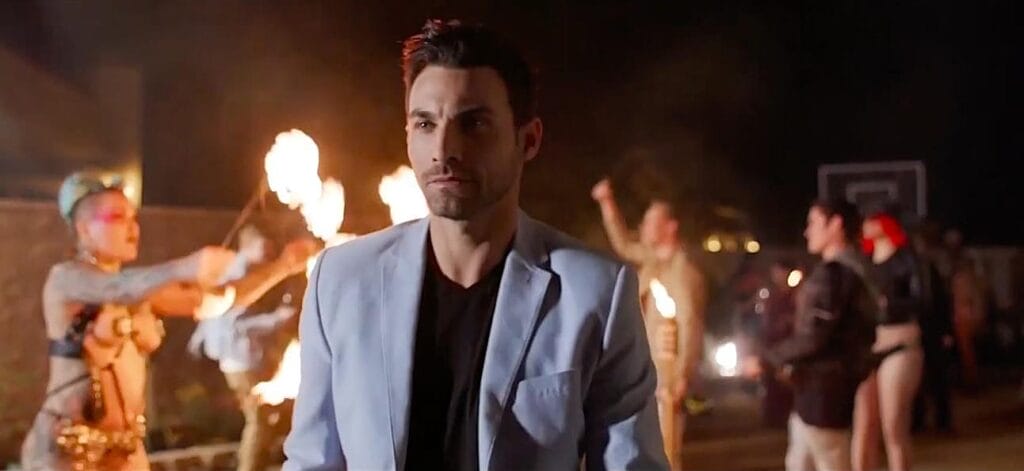Starf*cker is a movie starring Erik Fellows. It is written and directed by Mark David.
A biting and sharp satire about Hollywood with a good looking fella chasing fame, or infamy at all costs.
Premise
Jimmy Starr is an actor without much success, who happens to be a narcissist, with ADHD, and bi-polar disorder, and is, to top it off, a sex addict. Ambitious as he is, he will not shy away from humiliating himself time and again to attain his aim: fame.

Review
It is difficult to classify this move: is it a comedy, a drama, a dramedy? That will be up to each viewer to establish. It is a movie with dark, unforgiving humor, full of irony, and it does not hold back on the social commentary. It is full of humorous scenes, and dialogue, but it also evokes mixed feelings, ultimately some sympathy for the protagonist.
Starf*cker is a drama disguised as a comedy, an astute and blighting social satire, produced with apparent ease and some nonchalance. It distances itself from the pretty, bright lights leaning towards the “indie side of life” depicting those who, wanting to be stars, and do not make it, however, in some way or other, still hold on to the “fantasy life” that is associated to that Hollywood image (mirage?).
The script is harsh, but good in its portrayal of absurd scenarios. Take, for example, when Starr is offered a role in a film titled ‘African Pie’, which in the words of the director in the movie, really well portrayed by Cicero Salmon III, is an, “urban twist on American Pie…an urban taboo- telenovela, with a twist of teen-pop, torture-porn to it.” The daring dialogue lines are constant, another instance being the scene with Clement von Frankenstein playing the part of a faux German cinematographer, enunciating his motto with a heavy Teutonic accent, “Yes, ve clan”.
Yes, indeed, the script is laden with irony, with its cut-throat funny lines, going all in, and not beating around the bush in its satire of everything and everyone. The irony even shines through the way the movie has been filmed, with some handheld camera takes, giving it a deliberate reality show-like air. That leads me to mention the photography, which is good, though a greater budget might have polished it.
As far as the story goes, it follows a coherent structure, in great part thanks to the editing. It is divided in nine chapters, each marking a new stage in Starr’s pursuit of fame, and has that quality that good stories have, which is that it begs for a sequel – yes, that was actually a thought that crossed my mind. The characters evolve, and there are probably many more amusing, perhaps not as shocking, stories to be told. With its good comedic timing, which it plays with, and even challenges it, in the style of The Player (1992), a movie it by the way references, it manages to amuse and keep the viewer engaged, at times appalled, at others even sympathizing with the some of the characters and the protagonist.
It could easily have been a more bitter and somber story, but it does not intend to immerse the spectator into the potential calamity of the reality it depicts. Instead it gives us through a funny, obnoxious and unrelenting character, a more distanced take on that reality.
It is definitely Erik Fellows who “owns” the movie playing the part so well, he gives his character credibility, managing to portray a man who is quite distanced emotionally, and suavely rolls with the punches as long as he gets his prize: fame, or infamy. Fellows is an inspired actor who knows how to relay, entertain and amuse, together with his fellow cast members that give it their all, in each their roles.
In Conclusion
A comedy that deceives by its plain appearance, might even seem “silly” in its wrapping, but it is in fact laden with commentary delivered with a good dose of irony.

